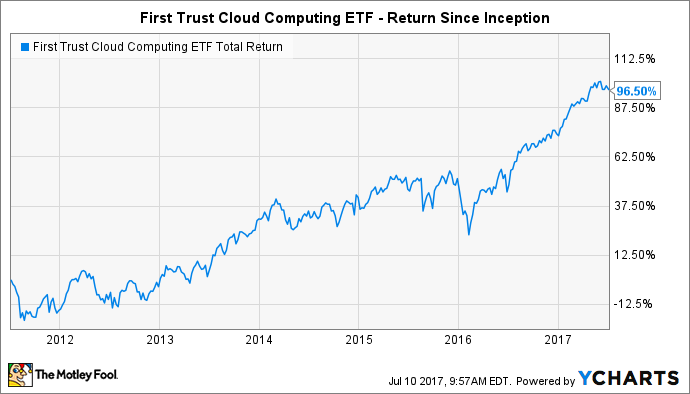Cloud computing has taken the technology sector by storm, making it possible for major enterprises to gain access to cutting-edge data analytics and storage capacity without building out a huge in-house technology infrastructure framework. Many of the companies that have helped their clients establish their presence in the cloud have performed quite well for investors, and the ongoing trend toward coming up with new technologies makes it likely that cloud computing companies will remain strong. The ISE Cloud Computing Index provides a handy benchmark for investors to use to track the budding industry, and you can even invest in an ETF that offers direct exposure to the index to let you take advantage of its future potential for growth.
What the ISE Cloud Computing Index is and how it works
The ISE Cloud Computing Index was developed by International Securities Exchange ETF Ventures as one of several innovative indexes tracking growing industries and emerging technologies. The business model for ISE ETF Ventures is to come up with attractive index ideas and then find partners to launch exchange traded products, including ETFs.

Image source: Getty Images.
For the Cloud Computing index, component companies must be actively involved in the cloud computing industry. Market capitalization must be at least $100 million, and the stock must trade on a sufficiently large global stock exchange. From there, the index divides the universe of eligible stocks into three categories: pure-play cloud computing companies, non-pure-play cloud computing companies, and technology conglomerates. That last category gets a weighting of 10%, with non-pure-play stocks getting their share of the total market capitalization across all three categories, and pure-play stocks getting the rest. This results in an overweighting of pure-play cloud computing stocks compared to their market capitalizations, and that has the positive effect of downplaying the weighting of large conglomerates that only indirectly use or support the use of cloud computing technology.
How can you invest in the ISE Cloud Computing Index?
ISE ETF Ventures worked with First Trust Advisors to develop the First Trust Cloud Computing ETF (SKYY +1.57%). It started trading in 2011 and is listed on the Nasdaq Stock Exchange. The ETF holds 30 different cloud computing stocks and has almost $900 million in assets under management, making it a relatively small but viable fund. With a five-year average annual return of more than 17.5%, the First Trust Cloud Computing ETF has done a good job of keeping up with its tracking benchmark, trailing by roughly the amount of the exchange-traded fund's 0.60% annual expense ratio.
SKYY Total Return Price data by YCharts.
A look at the ETF's top holdings reveals some useful information about how the ISE Cloud Computing Index weights various stocks. The top three stocks right now are Oracle (ORCL +2.40%), Red Hat (RHT +0.00%), and Akamai Technologies (AKAM +0.88%), each making up a bit less than 5% of the total assets of the fund.
Each of those three companies has made aggressive efforts to capitalize on cloud computing. For Oracle, the $9 billion purchase of NetSuite helped bolster its strategy to go up against rivals by incorporating its database prowess with its presence in the cloud. The move is also a defensive one, ensuring that current Oracle clients won't have to go elsewhere for cloud services and therefore potentially defect from Oracle's customer ranks entirely.
Red Hat has already seen huge success from its cloud efforts. Even the company itself has been surprised by the pace of demand for cloud solutions, and with a full suite of offerings that includes an overall cloud computing platform as well as related tools for enterprise customers to use, Red Hat has been able to deliver consistent growth. Clients also like the hybrid cloud model that Red Hat has, allowing them to mix public and private clouds to match up with their specific needs.
Finally, Akamai has stuck to its guns with its media-related distribution services, allowing customers like videogame companies to serve software downloads more efficiently. Data transfer is a key aspect of cloud computing, but Akamai has found that its security solutions business is also becoming a priority for the company. Despite some near-term bumps in the road, Akamai has lucrative prospects that could keep driving growth higher.
A simple way to invest in cloud computing
For investors who believe that cloud computing has more potential for the future, the ISE Cloud Computing Index offers a simple but effective way to invest in the space. Whether you use the First Trust ETF or just track its holdings and buy individual company shares yourself, cloud computing is a groundbreaking technology that will keep enterprise customers interested for years to come.


